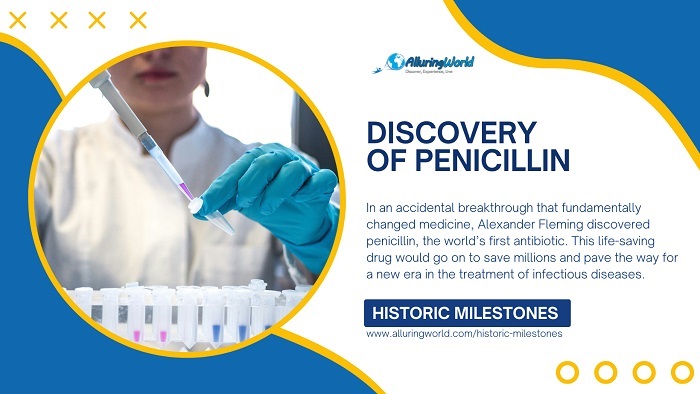Read time ca. 4 minutes
In 1928, a simple observation in a London laboratory revolutionized medicine and forever changed the way humanity combats infectious disease. Scottish bacteriologist Alexander Fleming discovered penicillin, the world’s first proper antibiotic, after noticing that a mold called Penicillium notatum produced a substance that killed or inhibited many harmful bacteria. A situation that began as an accident became one of the most important medical breakthroughs in human history, as it would go on to save millions of lives and it would mark the birth of the antibiotic era.
The Accidental Breakthrough:
Returning from a holiday, Alexander Fleming noticed a peculiar sight on one of his petri dishes. One of his many petri dishes was contaminated with a mold spore, but what he noticed to be truly remarkable was the clear, bacteria-free zone surrounding it. Fleming, who was a meticulous researcher, realized that the mold was actively killing the Staphylococcus aureus bacteria he had been growing, preventing their growth in a halo around the contaminant. In turn, this serendipitous observation sparked his curiosity, as it made him more curious and led him to investigate further.
Fleming’s subsequent studies revealed that the mold, identified as Penicillium notatum, produced a potent substance capable of destroying bacteria. He named this powerful antibacterial agent penicillin. Even though this discovery was initially challenging to isolate and mass-produce, it laid the foundation for the age of antibiotics, which in turn fundamentally transformed the treatment of infectious diseases. Penicillin’s ability to combat bacterial infections would ultimately save countless lives.
From Laboratory to Treatment:
As soon as he identified the potential the penicillin would bring, sadly, Fleming lacked the technology to purify it into a usable drug, so his findings remained relatively obscure for years. However, in the late 1930s, a team from the University of Oxford took up the challenge. Howard Florey, Ernst Boris Chain, and Norman Heatley worked tirelessly to develop a method for mass-producing the drug.
Their relentless efforts were a remarkable success, as they would bring penicillin to be manufactured on a larger scale. By the time of World War II, it would be greatly needed. The drug was critical in treating infected wounds and saving the lives of countless soldiers on the battlefield, so this collaboration among science, industry, and medicine is nowadays regarded as one of the most significant achievements in history.
A New Era in Medicine:
Considered to be a pivotal turning point in human history, the introduction of penicillin into everyday life profoundly altered the course of medicine. Before its widespread use, common bacterial infections like pneumonia, scarlet fever, and syphilis were often deadly, as there were very few effective treatments. As the years passed, penicillin was discovered to offer a cure for these ailments, dramatically reducing mortality rates and bringing about a new era of medical hope.
Beyond its immediate impact, penicillin’s success was just a stepping stone in the way of the discovery of numerous other antibiotics, which would serve humanity for the greater good. This new class of drugs formed the cornerstone of modern infection control, completely transforming healthcare and allowing for complex surgeries and medical procedures that were previously too risky due to the threat of infection.
Lasting Legacy:
Today, penicillin remains a cornerstone of modern medicine, but the growing problem of antibiotic resistance has challenged its effectiveness. As this issue was foretold by Alexander Fleming himself, he warned about the fact that the bacteria are evolving to become immune to the drugs designed to kill them. He emphasized the critical need for responsible use to prevent this very outcome, a message that is more relevant now than ever.
Despite the challenges posed by resistance, the discovery of penicillin is regarded as one of the most significant achievements in medical history. Nowadays, penicillin is celebrated not just for its direct role in saving millions of lives and providing a cure for previously fatal diseases, but it is also celebrated for fundamentally reshaping the relationship between humanity and science, as it established a new era where infectious diseases could be controlled and conquered.
Conclusion:
Overall, the discovery of penicillin by Alexander Fleming was more than a scientific breakthrough—it was a gift to humanity that redefined medicine. What began as an accident in a petri dish became the foundation for modern antibiotics, demonstrating that even the smallest observations can have a profound impact on the world.

